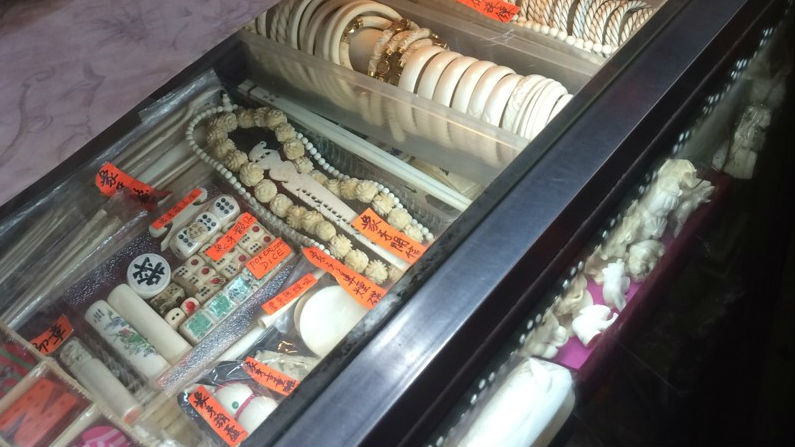Hong Kong's Ivory Regulations Flaunted

Surveys by the NGO TRAFFIC of Hong Kong’s ivory markets indicate that traders are flaunting regulations.
In a report Closing Strategy: Ending ivory trade in Hong Kong, the NGO found that 59 percent of the outlets did not have (or even claim to possess) ivory retail licenses, a violation of local ivory trading terms and making it impossible for consumers to distinguish those premises trading legally from exclusively black market operations.
Traders at 27 out of 76 licensed ivory outlets (36 percent) were found to be encouraging buyers to smuggle ivory out of the city without the appropriate export permits.
Hong Kong's location on China's southern coast has long made the port a main transit point for ivory, other endangered animal products and for large volumes of wood in an international illegal timber trade worth up to $100 billion.
Large volumes of illegal ivory from Africa have been seized in Hong Kong, some in transit to Vietnam, but mostly with the final destination unknown.
Hong Kong is entering a critical time for its centuries old ivory trade, with the Legislative Council soon to consider a proposed amendment bill that would see the phase out of the city’s domestic ivory market over the next five years.
The Council’s deliberations will be set against a backdrop of Hong Kong’s significant role in the international illegal ivory trade, with some of the world’s largest ivory seizures interdicted at the city’s borders between 2010 and 2013, worth an estimated HKD84 million ($11 million) in 2013 alone. They included ten large-scale seizures totalling more than 16 tons of ivory, each more than 500 kilograms (1,100 pounds), a weight considered indicative of the involvement of organized criminal networks.
Last month, the Chinese Government shut down 12 carving factories and 55 licensed ivory retail outlets in the first phase of its commitment to cease all commercial trade in ivory by the end of 2017 in mainland China.
Earlier this year, COSCO Shipping Lines issued a statement saying that, as signatory member to the United for Wildlife Transport Taskforce Buckingham Palace Declaration, and recognizing the devastating impact of illegal wildlife trade, the company will not knowingly facilitate or tolerate the carriage for illegal wildlife trade and will not accept cargo booking for any illegal wildlife related products.
The new report cautions this development could lead to illegal movement of unsold ivory from mainland China to other active ivory markets in the region, including Hong Kong, if current plans to end the city’s ivory trade market are not shortened from the proposed, but not yet agreed, five-year phase out.
The new TRAFFIC report also highlights the fate of Hong Kong’s 75 tons of registered ivory stocks which it says requires urgent action by the Hong Kong Government. Unless properly managed, this stockpile could leak into other ivory markets once the local trade ban is enacted. Other challenges concern illegal ivory transactions through the internet and social media and the regulation of antique ivory.
“Hong Kong’s local ivory trade ban must be accompanied by an amplified suite of monitoring and law enforcement activities if the full impact of the proposed ban is to be realized,” said Tom Milliken, TRAFFIC’s Elephant and Rhino Programme Leader.
“Experience teaches us that bans with commensurate investment and dedication to their effective implementation would deliver the best outcome.”
The global illegal wildlife trade is valued at between $5-20 billion per year. It is the fourth most lucrative global crime after drugs, humans and arms trafficking.
The report is available here.
